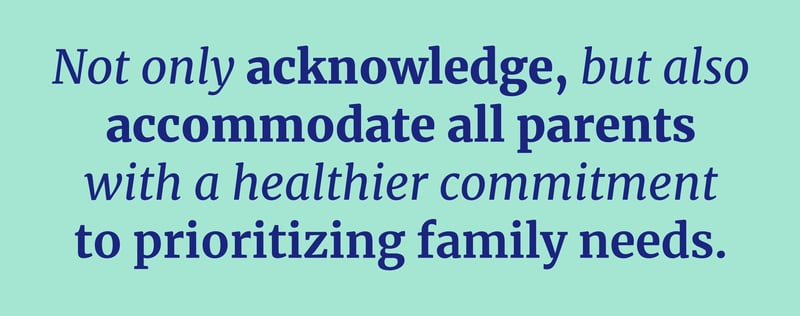It is well-documented that the pandemic and all of the work, school, home and relationship upheaval it has caused has been carried primarily by women. Mothers, in particular, have borne nearly all of the job losses, navigated most of the school for and with children, been responsible for even more household tasks and managed an even greater emotional load.
The answer is to right this course often falls back on those same mothers – Try meditating! Send kids back to in-person school! Hire a house cleaner or have groceries delivered! Sit down with your partner and create a schedule you can both stick to together!
Now is the moment of opportunity for employers, coworkers and friends to show up in support of working parents. And this is not just for now, but for life well beyond the pandemic.
We asked working parents how their workplaces have really shown up for them, and how some of them, founders and managers and bosses themselves, have created best practices for supporting the working parents on their payroll. Here’s what they told us.
Time off: unlimited PTO
While Netflix, other nationally lauded companies, and many, many more emerging startups and smaller companies have enacted no vacation limits, there are still employers who consider these policies to be too radical. Releasing strict limits on paid time off and what it can be used for, however, can be linked to attracting and retaining talent, employee satisfaction, and contribution to the company community.
Stefania Pomponi, founder of Hella Social Impact ,11-year CEO veteran, and single mom is an ardent advocate of trusting team members to manage their own time.
“Have unlimited PTO and don’t question what it’s being used for,” she advises. “We’re all competent adults. As long as the work is getting done, I don’t care if staff takes time off during the day for a doctor appointment, haircut, or to spend time with their partner.”
A critical component, she says, is modeling it from the top of the organization.
“As a manager, make it known by setting the example yourself that parents can take time off to attend their kid’s violin recitals, which always seem to start at 1:17 pm. As a leader, I don’t want to work with anyone who’d miss the squeaky violins in favor of taking a call. Not my corporate values.”
That kind of managerial modeling has impacted communications and networking assistant Jennifer Boyle-Tucker.
“I'm grateful for managers who model taking care of themselves – flexing time for family, appointments, etc. – so I don't feel bad when I need to do the same.”
Time to focus: childcare compensation
Offering childcare stipends, setting up a sitter service or having in-office daycare enables parents to give concentrated attention to work, particularly when responsibilities happen after hours.
“My husband’s company provided backup and emergency childcare, which was a godsend when our kids were younger and we were dealing with random school days off,” says Boyle-Tucker.
The medical society April Metz de Montiel leads not only compensates her directly for childcare when she’s called on for evening meetings, they support her work travel with children, too.
“Once I got to take my kids to a conference where [the medical society] had rented a booth. They allowed my kids to come, and paid for a nanny at the conference so I could attend the booth without caring for kids at the same time,” she says.
Time to parent: flexibility in how and when staffers show up
While many offices now have private nursing rooms or pumping stations for moms of babies, there’s a call for employers to not only acknowledge but accommodate all parents with a healthier commitment to prioritizing family needs.

It is time for industries to support all working parents by modeling and encouraging men to take family leave when a child is welcomed into their family, says attorney Dana Peterson Harrits.
“Male colleagues should get really vocal about their needs for family time, then actually follow through with taking the time. That’s where I see room for improvement in my firm and industry, with male partners doing the modeling.”
Normalizing parent multitasking, particularly during the pandemic, is valuable for brand director Katherine Stone.
“I have Webex meetings while I’m sitting in the car line picking up my kid from school,” she says. “I participate fully and people don’t question if I’m not showing my face on video or it’s obvious I’m in the car.”
Recognizing pandemic demands on all sides, Stephanie Wilson’s employer supports flexible scheduling.
“I’m a working single mom with four children remote learning (still!). My employer has allowed me to set my own schedule and work from home as much or little as I want. My kids’ schedule comes first.”
Careful logistics, clear expectations, and trust are the keys making flex time a super power for teams, says manager of app development Paul Widor.
“My entire team is parents. We aren’t paid by the hour and we don’t ‘clock in.’ I make sure my team knows I’m flexible with work hours. We do have a staff policy (made above my pay grade” that we’re to be available from 10-3, and we flex around that,” he says. His solutions include posting work schedules in a shared calendar for the entire team to see, informing each other when changes come up, using Slack for quick communication, and morning meetings to strategize the day’s tasks with whomever is available.
Kompare says flex time helps compensate talented employees for working at a college where the pay is not best in industry. And as Pomponi calls for with her team, it also establishes mutual trust.
“I know my staff gets their work done, shows up at scheduled meetings, and they meet planned project timeliness,” he says. “We trust each other to be professional. Trust is what makes all of this work; micromanaging would destroy everything.”
Time to start: right now
If your business has room to better support working parents, begin addressing the gaps and opportunities before staffers return to the office or projects ramp back up as demands and reopenings grow. Here are a few small steps that working parents we spoke to implemented on their teams or praised their bosses for instituting.
- Provide ongoing monthly mental health days for staffers to use for self-care or other ways to recuperate from carrying so much load.
- Be welcoming to babies and children who appear on screen during video meetings.
- Stop apologizing for tending to children’s needs during calls, meetings, or work days.
- Ask team members how the company can better support them (beyond Zoom happy hours) now and for the long-term, and invite creative parent-friendly solutions.
- Be transparent about how you’re addressing your own family needs to encourage other parents to share their strategies and challenges openly.
Jessica Ashley is a writer, content strategist, and coach whose life’s work (paid, unpaid, and in endless school board meetings) is focused on empowering women through tough transitions with creativity, grace and maybe some cussing.

